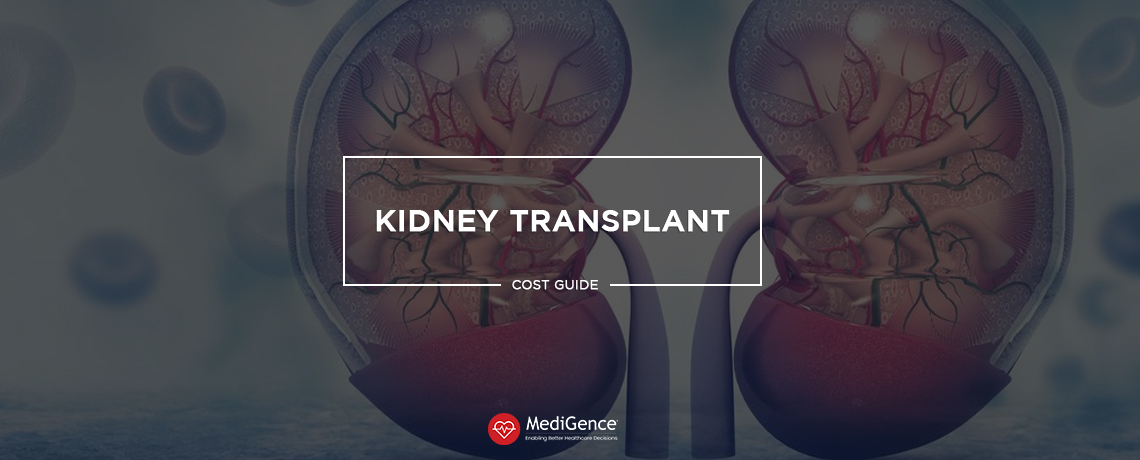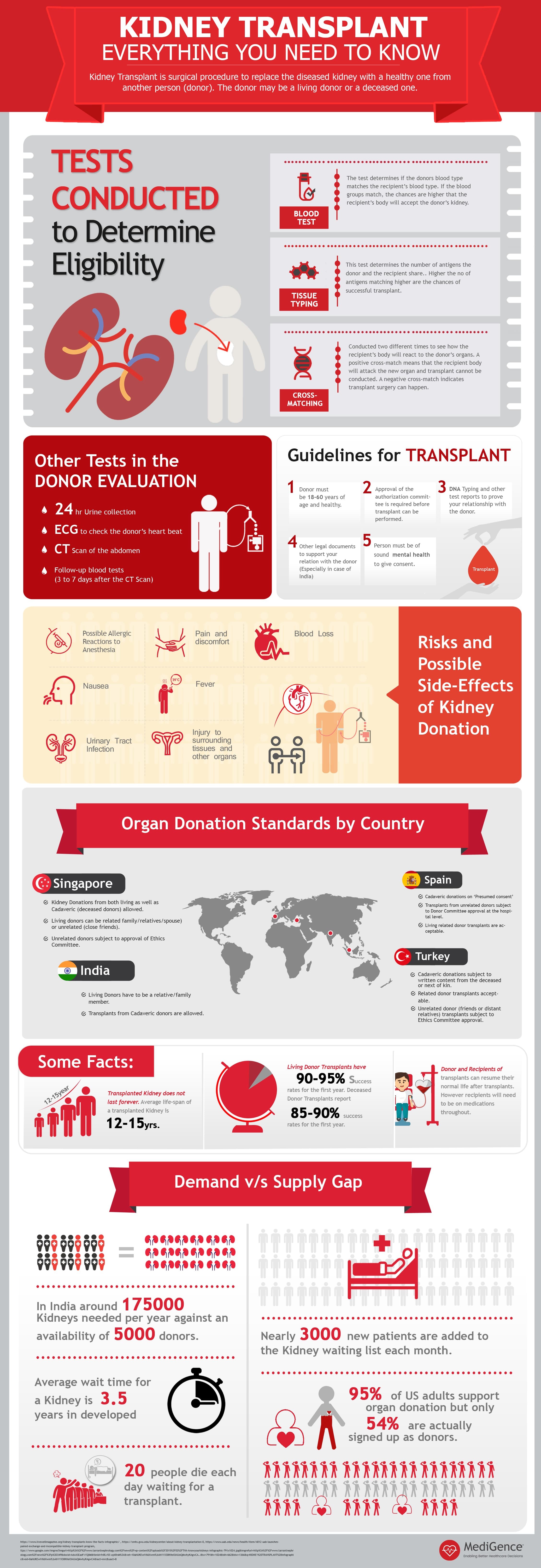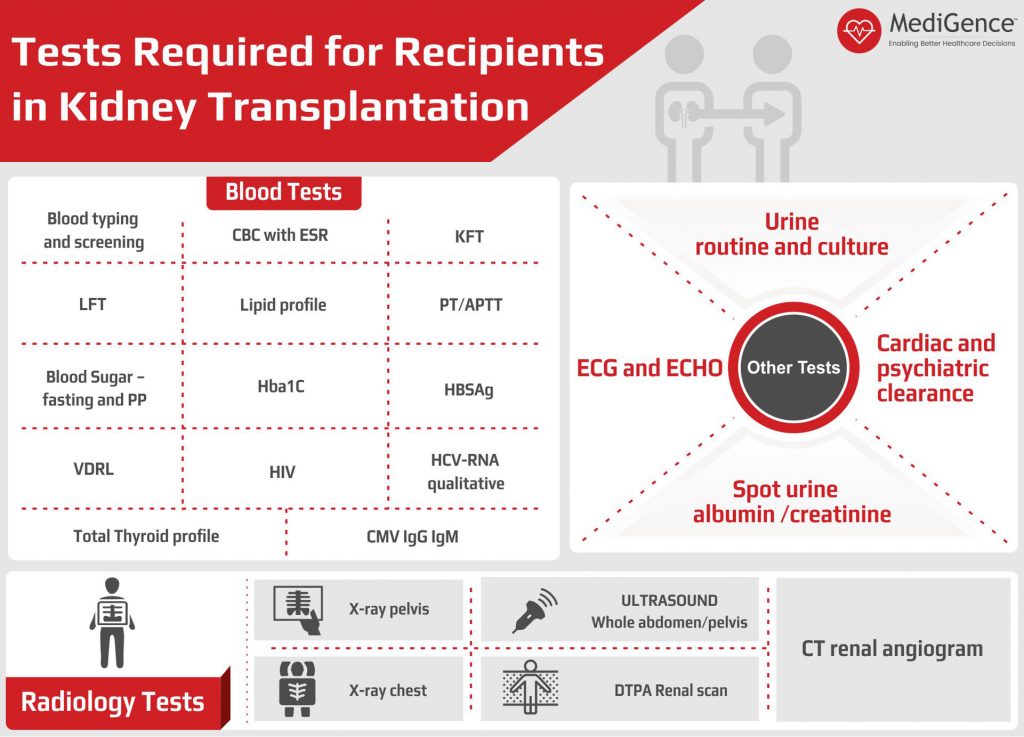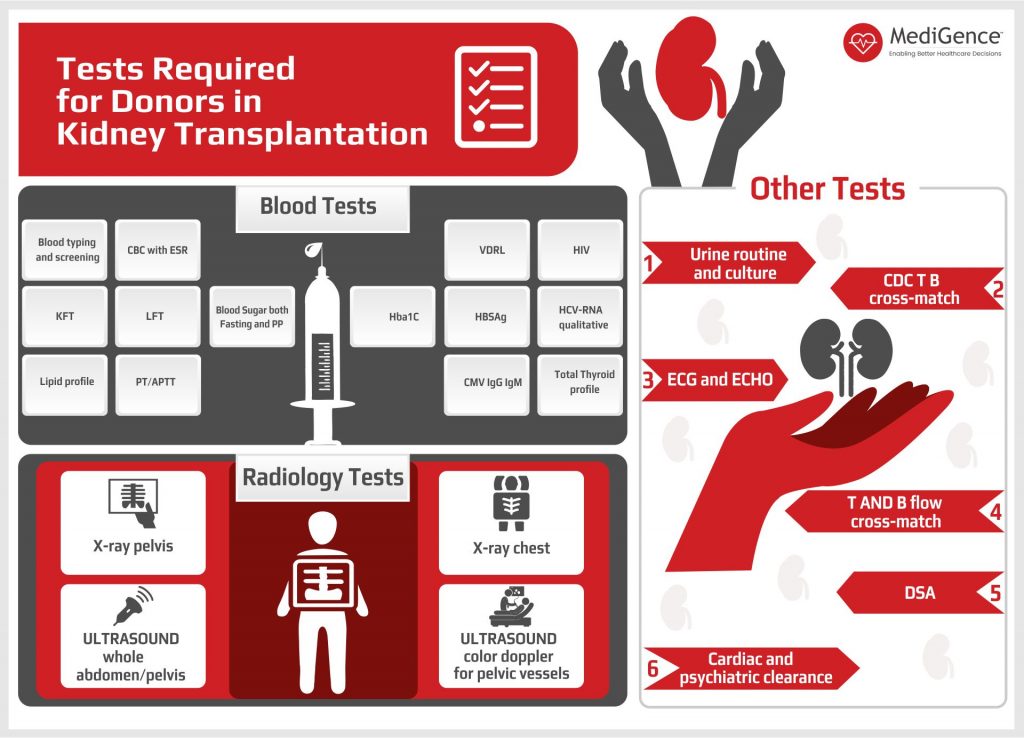Apollo Hospital
Chennai,India
 Aug 25, 2018
Aug 25, 2018 
Kidney transplantation is a major surgery that involves the placement of a healthy kidney in the body of the patient. The doctors conduct the surgery only when both the kidneys are not functional or when the patient has end-stage kidney disease.
The healthy kidney is retrieved from the body of a suitable living donor. The living could be related to the patient or completely unrelated, yet emotionally attached to the patient. A majority of countries, however, do not allow kidney transplantation from an unrelated donor. Singapore and Turkey are two such countries that allow kidney transplantation from unrelated yet known donor.
Some countries allow the use of a kidney from a cadaveric donor as well. In such cases, it is mandatory that the deceased person is registered as a donor. If the deceased person was not a donor, the immediate family members can give their consent to donate the organs of the cadaver. However, a majority of countries allow kidney transplantation from a cadaveric donor for their own nationals and not a patient from abroad.
The kidney transplantation legal formalities and laws for foreign nationals, however, varies from one country to the other. It is a complex and major procedure that involves a series of testing on the patient and the donor. It also involves a thorough review and scrutiny by the Ethics Committee in case of an unrelated donor. The purpose of this scrutiny is to check that it is a genuine case of kidney transplantation and there is no illegal organ donation involved.
The objective of this Kidney Transplantation Cost Guide is to brief you about the costs and expenses that you may have to incur while undergoing a kidney transplant abroad. Additionally, it provides a detailed break-up of what you should expect before, during, and after kidney transplantation in terms of expenses.
Doctors recommend kidney transplantation to patients with end-stage renal disease (ESRD) or Stage 4 or Stage 5 chronic kidney disease (CKD). The doctors first conduct a series of tests to check the functioning of the kidneys, including the glomerular filtration rate (GFR) and creatinine levels. If indicated, they may recommend kidney transplantation to extend the life of the patient.
Patients with ESKD are advised to undergo dialysis once, twice, or thrice a week, depending on the medical condition of the patient. Dialysis is important to ensure that the body of the patient keeps functioning normally and the waste products are eliminated from the body. An alternative to dialysis is kidney transplantation, following which dialysis is no longer required in the long term.
Kidney transplantation is an expensive procedure as compared to dialysis. However, a kidney taken from a donor lasts for around 10 to 15 years. However, dialysis is required at regular intervals.
Therefore, in terms of cost-effectiveness, kidney transplantation is preferred as compared to dialysis. This is because every time a patient gets dialysis done, he or she has to pay for the procedure and also bear the hospital bed charges.

Kidney transplantation is a complex procedure. There are several factors that control the cost of the procedure. It is likely that the cost of kidney transplantation varies from one patient to the other because each patient is different with respect to individual parameters, medical history, and needs. Similarly, the characteristics of the donor vary from one individual to the other.
While the cost of other medical procedures and surgeries may remain more or less the same among patients, transplant procedures are different. This is because organ transplantation surgery involves two parties – the recipient and the donor. The parameters of the donor and the recipient may vary among different cases, which, in turn, affects the total cost of transplantation.
The following are some of the top factors that affect the cost of kidney transplantation:
Kidney transplantation cost in India is much less as compared to other medical tourism destinations. For example, the cost of kidney transplantation in Singapore can be as high as five to ten times as compared to India. On the other hand, the kidney transplantation cost in Turkey is close to that of India. It is, however, an expensive procedure in Thailand and Israel.
During the course of pre-surgery investigations, the donor requires regular dialysis to keep the body functioning until the doctors conduct transplantation. Sometimes, a couple of dialyzes are also required during the first two weeks after transplantation until the new kidney fully adjusts to the body of the recipient. This has an impact on the total cost of treatment.
The doctors conduct order a series of blood and other biochemistry tests for both the recipient and the donor before the actual surgery. Sometimes, a few parameters of the donor or recipient could be abnormal, thus requiring some form of medical management. This affects the total cost of treatment.
Additional medical management and monitoring are required in the case of an unrelated donor that has no blood connection with the patient. In such cases, the kidney transplantation cost may go higher as the recipient requires an extra dose of anti-rejection medicines and higher monitoring levels.
The cost of treatment goes up as the number of days that the recipient and donor are required to stay in the hospital increases. Usually, in case of no complications, the donor is discharged after five days of the surgery. On the other hand, the recipient is discharged after 10 to 12 days of the surgery. In case any complication arises, the patient or the donor may be required for an extra number of days, which may increase the hospital bill.
The chances of rejection are higher when the patient has had a kidney transplant done before. Therefore in the case of repeat or second kidney transplantation, the level of care and the dose and type of medications required as compared to the first transplant cases exceeds. The re-transplant patients often require intravenous immunoglobulin (IVIG) treatment, which costs additional to the kidney transplantation procedure.
The cost of kidney transplantation also depends on the chances of organ rejection by the donor. This is mostly figured out at the time of pre-surgery investigations.
For example, if the patient has a positive panel-reactive antibody (PRA) test for Class 2, then preoperative plasmapheresis, IVIG, rituximab treatment may be necessary before the transplant surgery. This reduces the chances of ejection. However, this treatment is given at an extra cost.
In the case of an unrelated donor, prior approval from the Ethics Committee is required before the patient can undergo the surgery. An Ethics Committee is a group of professionals and comprises of doctors, psychiatrists, police officers, and other concerned individuals. The purpose of the Ethics Committee is to ensure that it is not a case of illegal transplantation and that a fair practice is being carried out.
The interview with the Ethics Committee involves the preparation of a certain set of documentation, which is then translated into the local language. It is then presented to the committee. The preparation of documentation and its translation comes at an extra cost.
Singapore and Turkey are the two leading medical tourism destinations that do kidney transplantation from unrelated donor. In these countries, the Ethics Committee sits twice a month to interview kidney transplant candidates and their unrelated donors.
|
Country |
Kidney Transplantation Cost |
|
$ 13,000 |
|
|
$ 21,000 |
|
|
$ 67,000 |
|
|
$ 35,000 |
| Pre-surgery Costs | Surgery Cost | Post-surgery Costs |
|
|
|
Testing to see if you can donate a kidney begins with a blood test. The test will determine your blood type and if it will match the recipient’s blood (compatibility). If your blood type is compatible with the recipient, two more blood tests will be done (tissue typing and cross-matching).


Patients who travel from abroad to a particular country for treatment have to bear an additional cost of hotel accommodation, local traveling, and food. This additional cost on top of the treatment cost depends on individual preferences. For example, a patient may decide to stay in a 3-star, 4-star or 5-star accommodation and prefer to eat exquisite cuisine during his or her stay. The cost increases with an increase in the level of luxury that a patient looks to have.
The following table highlights the approximate cost of accommodation and food in some of the most popular medical tourism destinations:
| Cost
(per night/day) |
India | Thailand | Turkey | Singapore |
| Accommodation (3-star) |
$30 |
$25 |
$20 |
$60 |
| Accommodation (4-star) |
$40 |
$36 |
$30 |
$90 |
| Accommodation (5-star) |
$75 |
$76 |
$44 |
$120 |
| Meals for Two Individuals | $20 |
$26 |
$42 |
$90 |

Looking for Customized Treatment Plan for Kidney Transplant?
Talk to Our Experts| Country | Hospital |
| India | Indraprastha Apollo Hospital (Delhi NCR) |
| BLK Hospital (Delhi) | |
| Max Hospital (Delhi NCR) | |
| Fortis Group of Hospitals (Pan India) | |
| Turkey | Medipol Mega University |
| Medicana International Hospital | |
| Memorial Healthcare Group | |
| Anadolu Medical Center | |
| Thailand | Vejthani Hospital |
| Phyathai Hospital | |
| Bangkok Hospital | |
| Singapore | Raffles Hospital |
| Mount Elizabeth Hospital | |
| Parkway East Hospital |
India:
Chennai,India
In the year 1983 Apollo Hospitals Chennai- the flagship hospital was established. They were the first to nurture the idea in the nation to not only provide holistic healthcare but uplift it to be the face of international standards catering to individual reach and capacities. They have worked tirelessly to catapult education, research and healthcare to reach its best times in the nation.
Strategically located, hotels near Apollo hospital Chennai is very easy to locate. The hospital h... Read More
140
PROCEDURES
42
DOCTORS in 13 Specialties
20+
Facilities & Amenities
Kolkata,India
Apollo Gleneagles Hospitals in Kolkata is the joint venture between Apollo Group of Hospitals chain of India and Parkway Health from Singapore. It is the only hospital to be accredited with the prestigious Joint Commission International (JCI), an international benchmark for quality treatments in the Eastern zone of the Indian subcontinent after a thorough evaluation procedure of testing safety and quality consistency parameters.
In six different categories it has received the much co... Read More
138
PROCEDURES
36
DOCTORS in 13 Specialties
20+
Facilities & Amenities
Bangalore,India
Gleneagles Global Hospital is a premium provider of Healthcare services in India through its chain of multi-super specialty hospitals offering tertiary and quaternary healthcare services with over 2,000 beds and state-of-the-art, world-class hospitals in Hyderabad, Chennai, Bangalore, and Mumbai. Gleneagles Global Hospital is a pioneer in Kidney, Liver, Heart and Lung Transplants. Gleneagles Global Hospitals is a specialist provider of Multi-organ transplant services for patients not just fr... Read More
116
PROCEDURES
29
DOCTORS in 14 Specialties
20+
Facilities & Amenities
Turkey:
Istanbul,Turkey
Altunizade Hospital is one of the most recent additions to the Acibadem Group, which is now renowned for its authentic architecture and specialized services. Located in the Üsküdar-Altunizade region, the hospital is known to have the largest indoor area in not only Istanbul but the rest of the country as well.
The hospital is the first facility to offer the Gamma Knife ICON device for the treatment of cerebrovascular diseases and tumours, allowing specialists to administer ... Read More
80
PROCEDURES
45
DOCTORS in 12 Specialties
6+
Facilities & Amenities
Istanbul,Turkey
Situated in Istanbul, Turkey & largest city, the International Hospital is a multi-specialty medical center offering the treatment and care in several healthcare specialties. The 118-bed hospital was recognized in 1989 and it is part of the Acibadem Healthcare Group, which holds 11 hospitals in Turkey.
Medical services and treatment vary from cardiology to neurosurgery, cosmetic surgery, oncology, orthopedics and many more. The hospital was modernized in 2006 and now has comforta... Read More
96
PROCEDURES
27
DOCTORS in 11 Specialties
6+
Facilities & Amenities
Istanbul,Turkey
Bahcesehir Liv Hospital is under the aegis of Istinye University. The hospital starts its operation in 2016. It is an excellent example of the collaboration of knowledge and technology. The services provided by the hospital include training, investigation, and education. The hospital has a world-class infrastructure. The hospital has a patient-centric approach and the vision is to treat patients successfull... Read More
55
PROCEDURES
36
DOCTORS in 11 Specialties
20+
Facilities & Amenities
Thailand:
Bangkok,Thailand
Phythai2 Hospital is a leading healthcare center in Bangkok offering world-class medical services to people since July’1987. The hospital is built on the theme which combines world-class clinical expertise, academic and research-based design with Thai hospitality. Centrally located at 943+Phaholyothin Road and is within walking distance of Sanam Pao BTS Skytrain Station which makes it easy access for patients from all parts of the city.
A multi-specialty hospital in the heart o... Read More
103
PROCEDURES
49
DOCTORS in 11 Specialties
6+
Facilities & Amenities
Bangkok,Thailand
Vejthani hospital was established in the year 1994 in Thailand. Since then they have strived to provide world-class medical care to all with their exceptionally innovative patient-centric care approach. They have served immensely in their community and have opened their doors to serve the whole country of Thailand. In order to uphold the spirit of giving quality services to all they have laid special emphasis on having all their accreditations in place and having them renewed as per industry... Read More
107
PROCEDURES
50
DOCTORS in 13 Specialties
6+
Facilities & Amenities
Bangkok,Thailand
One of the most renowned and honoured hospital networks in Asia- Pacific is Bangkok Dusit Medical Services ( BDMS). It has certification in clinical care program and also JCI accreditation. Due to its reputation it has been successful in building an international client base being able to cater to variety of medical needs and giving top tier services. In the year 2015 they have secured 5 th rank in the world of revenue having a market capitalization worth US$9.3 billion and bringing US $1.8 ... Read More
113
PROCEDURES
42
DOCTORS in 13 Specialties
4+
Facilities & Amenities
Singapore:
Novena,Singapore
Mount Elizabeth Novena Hospital in Singapore is the latest and a recent addition to the Mount Elizabeth legacy. This is a highly advanced and modern hospital that marks the beginning of a new era in the field of tertiary care medical treatments.
Mount Elizabeth Novena Hospital features more than 250 specialist physician suites that provide comprehensive tertiary care healthcare to patients from across the world. The hospital interiors have been tastefully designed to provide an enhan... Read More
104
PROCEDURES
13
DOCTORS in 14 Specialties
6+
Facilities & Amenities
Singapore,Singapore
Parkway East Hospital in Singapore is one of the most established and oldest hospitals in the country. This hospital, located in Telok Kurau and formerly known as the East Shore Hospital, was established back in 1942. Since then, the staff at the hospital has treated and provided healthcare services to thousands of domestic as well as international patients travelling for quality and affordable treatment services.
Parkway East Hospital started off as a clinic and a maternity hospital... Read More
91
PROCEDURES
0
DOCTORS in 14 Specialties
15+
Facilities & Amenities
Singapore,Singapore
Mount Elizabeth Hospital is a multispecialty healthcare facility operated by Parkway Health. The hospital officially started its operations in 1979. Since then, it has been offering quality healthcare services to patients from all walks of life and empowering them with an easy access to high-end and world-class diagnostics, treatment, and rehabilitative services.
The Mount Elizabeth Hospital is accredited by the Joint Commission International (JCI), which is an internationally recogn... Read More
103
PROCEDURES
0
DOCTORS in 14 Specialties
20+
Facilities & Amenities
Some of The Top Kidney Transplant Surgeons Video Consultation in India and Turkey
Some of The Top Kidney Transplant Surgeons in Thailand Without Video Consultation

Transplant Surgeon - Nephrologist
Kasemrad Ramkhamhaeng Hospital , Bangkok,Thailand
25 Years of experience
Dr. Thananda Trakarnvanich treats many conditions in patients as mentioned below
These doctors are into kidney care and treating kidney diseases and this branch is an internal medicine specialty. A Nephrologist is consulted by pe... View bio

Transplant Surgeon - Stem Cells Therapy
StemCells 21 , Bangkok,Thailand
10 Years of experience

Transplant Surgeon - Stem Cells Therapy
StemCells 21 , Bangkok,Thailand
15 Years of experience
Avail of the advanced Kidney Transplant Packages in India | Save upto 20% | Book Now & Travel Anytime from Anywhere
Novena,Singapore
Mount Elizabeth Novena Hospital in Singapore is the latest and a recent addition to the Mount Elizabeth legacy. This is a highly advanced and modern hospital that marks the beginning of a new era in the field of tertiary care medical treatments.
Mount Elizabeth Novena Hospital features more than 250 specialist physician suites that provide comprehensive tertiary care healthcare to patients from across the world. The hospital interiors have been tastefully designed to provide an enhan... Read More
104
PROCEDURES
13
DOCTORS in 14 Specialties
6+
Facilities & Amenities
Singapore,Singapore
Parkway East Hospital in Singapore is one of the most established and oldest hospitals in the country. This hospital, located in Telok Kurau and formerly known as the East Shore Hospital, was established back in 1942. Since then, the staff at the hospital has treated and provided healthcare services to thousands of domestic as well as international patients travelling for quality and affordable treatment services.
Parkway East Hospital started off as a clinic and a maternity hospital... Read More
91
PROCEDURES
0
DOCTORS in 14 Specialties
15+
Facilities & Amenities
Singapore,Singapore
Mount Elizabeth Hospital is a multispecialty healthcare facility operated by Parkway Health. The hospital officially started its operations in 1979. Since then, it has been offering quality healthcare services to patients from all walks of life and empowering them with an easy access to high-end and world-class diagnostics, treatment, and rehabilitative services.
The Mount Elizabeth Hospital is accredited by the Joint Commission International (JCI), which is an internationally recogn... Read More
103
PROCEDURES
0
DOCTORS in 14 Specialties
20+
Facilities & Amenities
Singapore,Singapore
Gleneagles Hospital in Singapore is a multispecialty healthcare facility, located extremely close to the center of the local shopping district. Situated close to the Singapore Botanic Gardens, this hospital is accessed by thousands of patients from within the country and abroad primarily because of its location that can be easily approached by a patient looking forward to high-quality treatment.
Gleneagles Hospital is accredited by Joint Commission International (JCI), which is ... Read More
102
PROCEDURES
0
DOCTORS in 14 Specialties
20+
Facilities & Amenities
Turkey
Istanbul,Turkey
Altunizade Hospital is one of the most recent additions to the Acibadem Group, which is now renowned for its authentic architecture and specialized services. Located in the Üsküdar-Altunizade region, the hospital is known to have the largest indoor area in not only Istanbul but the rest of the country as well.
The hospital is the first facility to offer the Gamma Knife ICON device for the treatment of cerebrovascular diseases and tumours, allowing specialists to administer ... Read More
80
PROCEDURES
45
DOCTORS in 12 Specialties
6+
Facilities & Amenities
Istanbul,Turkey
Situated in Istanbul, Turkey & largest city, the International Hospital is a multi-specialty medical center offering the treatment and care in several healthcare specialties. The 118-bed hospital was recognized in 1989 and it is part of the Acibadem Healthcare Group, which holds 11 hospitals in Turkey.
Medical services and treatment vary from cardiology to neurosurgery, cosmetic surgery, oncology, orthopedics and many more. The hospital was modernized in 2006 and now has comforta... Read More
96
PROCEDURES
27
DOCTORS in 11 Specialties
6+
Facilities & Amenities
Istanbul,Turkey
Bahcesehir Liv Hospital is under the aegis of Istinye University. The hospital starts its operation in 2016. It is an excellent example of the collaboration of knowledge and technology. The services provided by the hospital include training, investigation, and education. The hospital has a world-class infrastructure. The hospital has a patient-centric approach and the vision is to treat patients successfull... Read More
55
PROCEDURES
36
DOCTORS in 11 Specialties
20+
Facilities & Amenities
Bursa,Turkey
Medical Park Bursa Hospital started its operations in August 2016. From then onwards, it has been the mainstay of quality and affordable healthcare not only for the people living in turkey but the patients throughout the world. The world-class infrastructure and affordable price of treatment have registered this hospital on the map of medical tourism. The slogan 'Value-Added Medicine' aligns with the facilities and treatments available in this hospital. ... Read More
43
PROCEDURES
24
DOCTORS in 12 Specialties
19+
Facilities & Amenities
Istanbul,Turkey
Baskent University Istanbul Hospital is a large facility that offers treatment to patients worldwide. All major treatments from varied specialties are offered here. The hospital complex is spread across a huge13.000 m2 indoor area and features modern inpatient rooms fitted with the latest and advanced medical equipment.
Today, Baskent University Istanbul Hospital offers treatment across all major specialties, including organ transplantation, orthopedics, and traumatology, cardiac sur... Read More
141
PROCEDURES
22
DOCTORS in 14 Specialties
4+
Facilities & Amenities
Avail the advanced Kidney Transplant in Turkey | Save upto 10% | Book Now & Travel Anytime from Anywhere
Thailand
Bangkok,Thailand
Phythai2 Hospital is a leading healthcare center in Bangkok offering world-class medical services to people since July’1987. The hospital is built on the theme which combines world-class clinical expertise, academic and research-based design with Thai hospitality. Centrally located at 943+Phaholyothin Road and is within walking distance of Sanam Pao BTS Skytrain Station which makes it easy access for patients from all parts of the city.
A multi-specialty hospital in the heart o... Read More
103
PROCEDURES
49
DOCTORS in 11 Specialties
6+
Facilities & Amenities
Bangkok,Thailand
Vejthani hospital was established in the year 1994 in Thailand. Since then they have strived to provide world-class medical care to all with their exceptionally innovative patient-centric care approach. They have served immensely in their community and have opened their doors to serve the whole country of Thailand. In order to uphold the spirit of giving quality services to all they have laid special emphasis on having all their accreditations in place and having them renewed as per industry... Read More
107
PROCEDURES
50
DOCTORS in 13 Specialties
6+
Facilities & Amenities
Bangkok,Thailand
One of the most renowned and honoured hospital networks in Asia- Pacific is Bangkok Dusit Medical Services ( BDMS). It has certification in clinical care program and also JCI accreditation. Due to its reputation it has been successful in building an international client base being able to cater to variety of medical needs and giving top tier services. In the year 2015 they have secured 5 th rank in the world of revenue having a market capitalization worth US$9.3 billion and bringing US $1.8 ... Read More
113
PROCEDURES
42
DOCTORS in 13 Specialties
4+
Facilities & Amenities

Guneet Bhatia is an avid reader, healthcare writer, and is currently Director of Patient Care Department, MediGence. She has also been featured on many prominent Healthcare portals such as IBTimes, HCIT Expert, Clinician Today.
(+1) 424 283 4838